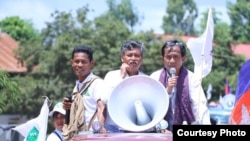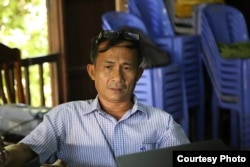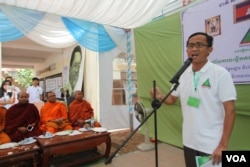Long before Yang Saing Koma became a politician, he was an evangelist for lemongrass.
As an agronomist who traveled from village to village meeting with farmers, he found himself surprised that more people were not even attempting to plant the easy-to-grow herb, which is integral to Khmer cooking. Instead, many purchased it from market vendors, who often imported it from Vietnam. He began pushing Cambodians to grow it themselves, pointing out that just one stalk planted in a kitchen garden could spawn dozens more.
After he gave up a career in the rural development sector to co-found the Grassroots Democracy Party (GDP) in 2015, the herb took on a deeper meaning for him. It is now his favorite political metaphor. To him, lemongrass represents the self-reliance and can-do spirit that Cambodia will need to move forward and break free of dependency on other countries.
“In some households, you can find no lemongrass planted. But if you are not even interested and do not place value upon a simple task, you cannot achieve bigger things,” he told VOA in a recent interview.
“Some Khmer people seem to neglect or fail to value what we can have simply, or what we can do. Cambodia should care about we have and believe in herself. You can jump up to do big things by starting with simple things like growing lemongrass.”
Now Yang Saing Koma is attempting to achieve his biggest task yet: competing with the long-ruling Cambodian People’s Party (CPP) for parliamentary seats in national elections scheduled for July.
For the first time since its creation in 2015, the tiny GDP will be campaigning across the country, tackling the improbable goal of beating the CPP on its home turf—rural constituencies dominated by farmers. It has just 10,000 members, to the CPP’s more than 5 million. And it will do so amid the tensest political atmosphere in recent memory. But Yang Saing Koma insists that the GDP has to try, even against formidable odds.
“We must do something,” he said. “Though we know that we have many issues to confront, we dare to face these kinds of challenges.”
“They now fell down, being stopped from running further, but we have the chance to run a relay race,” he said. “If we do not run further, it means we give up on reaching our final destination.”
Spreading Democracy, or Legitimizing Repression?
Some would disagree even with that assertion.
After the country’s main opposition party, the Cambodia National Rescue Party (CNRP), performed well in local elections in June, the ruling CPP embarked on a sweeping crackdown on political opposition and free expression, culminating in the dissolution of the CNRP in November by a CPP-packed Supreme Court.
All the CNRP’s leading politicians have been jailed or banned from politics, with some fleeing the country indefinitely. This has left Cambodia without its most popular and successful opposition party in history, and nearly all of its most famous opposition politicians.
Controversially, the GDP is presenting itself as ready to fill the gap. The party has been blasted by some opposition supporters for participating in the 2018 elections at all. Critics say that by campaigning alongside the CPP, the GDP is legitimizing a fundamentally unfair process and providing a smokescreen for the government to claim that Cambodia is a democracy.
However, Yang Saing Koma argues that the important thing is challenging the CPP’s supremacy and encouraging a democratic spirit in Cambodia, not the presence of any particular person or group.
The GDP’s primary goal, he says, is to change the kbuon chas (old norms) of Cambodian politics, particularly the personality-driven focus of both the CPP and CNRP, by putting policy and problem-solving first.
This focus on improving governance explains the GDP’s decision to participate in the 2018 elections despite the repressive tactics leading to the CNRP’s absence.
“They now fell down, being stopped from running further, but we have the chance to run a relay race,” he said. “If we do not run further, it means we give up on reaching our final destination.”
Even more controversially, he has called on opposition supporters to give up their CNRP affiliations and join the GDP, or form a new party. This has angered some, who say that the GDP and other small parties, however well meaning, are undermining the democratic process in Cambodia.
Mu Sochua, vice-president of the outlawed CNRP, who has been living in exile since being banned from politics and threatened with arrest in October, said forming a new party was out of the question. Instead, she and former CNRP leader Sam Rainsy are attempting to spearhead a new political movement from abroad.
“No! We will not found another political party! Creating a political party would mean that we are cheated by the CPP,” she told VOA. “No! No!”
“We [will participate in the election] only if there is the release of Kem Sokha, political return of the CNRP, assurance of a free civil society and independent media, and a credible National Election Committee.”
“Otherwise the 2018 election would be a stupid one, neither defending nor reflecting the will of the citizens. We cannot accept this! This will certainly undermine democracy.”
Astrid Noren-Nilsson, a scholar of Cambodian politics at Sweden’s Lund University, said the legitimacy of the July election was in such serious question that the participation of minor parties would probably not make much of a difference either way.
“I believe that the GDP is right to participate so as to offer a real opposition alternative,” she said in an email. “The CNRP’s dissolution is such a watershed event that the legitimacy of the elections cannot be salvaged by minor opposition parties participating anyway.”
“Being a Gentleman May Not Be Enough”
Key to the GDP’s push to change political norms is eschewing the politics of personality in favor of building strong institutions, piece by piece.
The GDP’s founders, who included Yeng Virak, who for years headed a legal education NGO, Sam Inn, who worked for a public health NGO, and Kem Ley, a political analyst, in addition to Yang Saing Koma, resolved to keep themselves above the political fray and frame their party around principles.
As they saw it, an overreliance on charismatic leaders like King Norodom Sihanouk, Pol Pot, and Prime Minister Hun Sen is the root of many of Cambodia’s past and present problems. So after co-founding the party, Yang Saing Koma stepped back and took on a lesser position, helping develop the GDP’s programs. Kem Ley relinquished a formal role in the GDP altogether.
Instead, the party tries to promote democracy through a bottom-up political process that encourages members at the grassroots level to vote for candidates and party leaders in a series of small-scale primary elections. And it wants to get rural Cambodians excited about ideas, holding local meetings to debate and vote on what policies the GDP should pursue.
However, Ou Virak, a political observer and founder of the Future Forum, a Phnom Penh-based think tank, said if the GDP ignores the allure of charisma, it will never garner the votes it needs to challenge the CPP at the ballot box.
“You have to attract before you can explain,” he said. “If you fail to attract, you will mostly fail.”
“If you want to attract a woman or attract support from the people, being a gentleman may not be enough and it may not be possible to prevail in politics,” he added.
Indeed, personality has a way of creeping into even the most austere political movements. Although Kem Ley had a relatively low profile when the GDP was founded, he was shot dead in a dramatic daylight assassination in mid-2016 that catapulted him into martyrdom.
A painting of his face is now prominently placed in party headquarters, and his association with the GDP seems to be a major draw for new members. And last week, Kem Ley’s brother announced that he would start a new party that places his brother’s image front and center. The “Kem Ley Party” will contest the July elections against the CPP and GDP.
Dr. Noren-Nilsson said the GDP’s goal of being totally policy-driven was impressive and refreshing, but probably unrealistic.
“In the longer run, elevating the level of the national conversation is a laudable ambition, but in a system in which personality is still paramount, this line may be rather detached from reality,” she said.
“If anything, with the crackdown we see a renewed stress on personality in politics and it will be these very powerful images and appearances that the GDP is up against.”
“Though they are legal and equal to us before the law, they lack experience, human resources, and knowledge to rule,” he said of the smaller party. “They also have limited understanding of the people’s concerns and also lack achievements in nation-building and serving the people.”
Planting Roots With Farmers
In January, the GDP released its first-ever political platform, pledging to prioritize administrative reform and provide universal healthcare, pensions for senior citizens, a student loan program and childcare stipends.
But its strongest focus remains the agricultural sector, an area of deep expertise for Yang Saing Koma, who has a doctorate in agronomy. Its politicians frequently make campaign trips to meet and train farmers, and the party publishes a series of brochures on farming techniques. If it can raise the funds, it plans to send 5,000 agronomists fanning out across Cambodia to teach cutting-edge growing techniques. Even its political rhetoric makes frequent use of agricultural metaphors.
However, some see this emphasis as misplaced in a rapidly developing Cambodia. With the economy growing at around 7 percent per year, many rural youth are migrating to cities and neighboring countries to seek opportunities away from the family rice farm.
“I think that efforts to appeal with agriculturalism may not be effective with people, especially the younger generations, who seek modernity or an internationally competitive image,” said Ou Virak of the Future Forum.
“You have to know that now, even peasants do not want their children to become a peasant.”
Others fear the GDP is naïve to believe that the ruling party is truly committed to democracy. Some Cambodian voters expressed concern that if the GDP became too popular, it would be targeted just like the CNRP.
Ly Seang, a market vendor in Phnom Penh, said she knew and liked the GDP, but did not believe it could ever be competitive in the current political environment.
“When you are small in size, you can hardly beat them [the CPP],” she said.
Chan Kong, a farmer in Kandal province, agreed with that assessment. Speaking to VOA as he built a small shrine in front of his house, he compared a political party to a complex construction project.
“To be able to build a house in a perfectly-done way, you have to whip the shape into a straight line like this,” he said, pointing to his growing shrine.
“Yang Saing Koma’s party has somehow come up with good democratic principles of bringing freedom and human rights, just like the CNRP, but it looks like a mission impossible due to the fact that they’ll be next in line to be wiped out when they grow bigger.
“From what I have learned from different regimes that I have lived through, when a small party grows bigger, it will be pushed aside to restart from scratch.”
Perhaps underscoring these concerns, Sok Eysan, a spokesman for the CPP, applauded the GDP’s participation in the election. He called it “the right decision,” one that showed Cambodia was truly a democracy.
“You can find lemongrass everywhere since any ordinary citizen can simply grow it,” he said. “That’s why we start with lemongrass.”
However, he quickly added that the GDP would certainly lose to the CPP, whose senior members have led Cambodia in some form since the 1980s. Mr. Eysan said there was not a chance that the CPP would not “defend its championship belt” in July, for the sixth straight time.
“Though they are legal and equal to us before the law, they lack experience, human resources, and knowledge to rule,” he said of the smaller party. “They also have limited understanding of the people’s concerns and also lack achievements in nation-building and serving the people.”
The real question now might be what is happening in the minds of “the people,” particularly the 3 million voters who supported the now-banned CNRP in the last election.
Yang Saing Koma said although beating the ruling party might seem like a lost cause, the GDP could still work to inculcate democracy on a small scale and encourage Cambodians to express their opinions at the ballot box.
“We cannot do anything else besides pushing our citizens to turn out to vote, especially the young people whose obligation is to decide on their own destiny in this country, where they will be here to stay long into the future.”
Chan Kong, the farmer in Kandal, said he thought many people were sitting tight and waiting to assert their political beliefs until the current crackdown passed. But this did not mean they were not forming opinions.
“We choose to remain silent, myself included. People dare not to make any move since everyone is living in fear. Though we see something wrong, we choose to pretend we agree with the narrative that they are right,” he said.
“Even a random cow herder in the paddy fields knows exactly what’s going on and what’s right or wrong.”
And this belief, after all, is the heart of Yang Saing Koma’s favorite analogy.
“You can find lemongrass everywhere since any ordinary citizen can simply grow it,” he said. “That’s why we start with lemongrass.”







